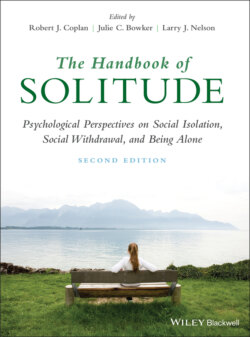Читать книгу The Handbook of Solitude - Группа авторов - Страница 53
Effects of paternal deprivation in rodents.
ОглавлениеHuman family structures are diverse and complex. Some children are reared by their mothers and fathers, some are reared by two mothers or two fathers, while others are reared in single parent households. Some children are cared by their biological parents, some by their nonbiological parents while others are reared by a combination of both biological and nonbiological parents. Given the diversity in children’s experiences of family structure and parental care, it would be important to use animal models to understand the impact of deprivation from a specific type of caregiving, such as paternal caregiving, on offspring’s developmental outcomes.
Similar to work with humans, the majority of animal research has focused on the role of maternal parenting behaviors partly because most monkey and rodent species are reared primarily by their mothers. Fortunately, there are some rodent species including prairie voles (Microtus ochrogaster), Mandarin voles (Lasiopodomys mandarinus), and California mice (Peromyscus californicus) that are monogamous and display biparental parenting. For example, similar to humans, prairie voles maintain diverse family structures. In the wild, about one‐third of prairie vole pups are reared by their mothers and fathers, about one‐third are reared by single‐mothers, and about one‐third are reared in small communal groups with their biological parents and several alloparents (Getz & Carter, 1996). Interestingly, the majority of virgin female voles display “alloparental behavior” when placed with non‐descendent pups, suggesting that they also demonstrate the ability to take care of nonbiological offspring (see Bales & Saltzman, 2016). Given the diversity in their family structures and complex social behaviors, species such as prairie voles are excellent models for investigating the specific roles of mothers, fathers, as well as the impact of “biparenting” and “alloparenting.”
An important body of work examined the role of paternal deprivation on offspring outcomes in prairie voles. Ahern and his colleagues (2011) conducted a series of experiments to examine the sex‐specific parenting behaviors displayed in biparental family units and the effects of paternal deprivation on offspring outcomes. In biparental family units, mothers and fathers did not differ in the extent to which they attended to their nests, a behavior important for the protection of the offspring. Mothers and fathers licked and groomed their pups at similar rates when they were alone with their pups; however, mothers licked and groomed their pups more than fathers did when both parents were in the nest, whereas fathers demonstrated more partner‐directed licking and grooming than mothers did. These findings suggest that although some responsibilities such as nest attendance were shared equally by parents, there were sex‐specific findings in the care of the offspring and partners when both partners were in the nest.
To test the effects of “paternal deprivation,” Ahern and his colleagues (2011) compared single‐mother and biparental households. They hypothesized that, to compensate for the absence of the paternal caregiving, single mothers would lick and groom their offspring more so than mothers in the biparental units. Contrary to this hypothesis, there were no differences in the extent to which single mothers and mothers in biparental units licked and groomed their pups. The absence of fathers had a large impact on the extent to which pups received parental care given that mothers did not compensate for the absence of paternal care. Compared to females reared by both parents, females reared without fathers licked and groomed their pups less especially when rearing them without a male partner, and displayed lower rates of alloparenting when presented with non‐descendant pups (Ahern & Young, 2009; Ahern et al., 2011). Both males and females raised without fathers were less likely to form normal pair‐bonding (Ahern & Young, 2009).
Research on the effects of paternal deprivation on offspring outcomes in mandarin voles yielded similar findings (Bales & Saltzman, 2016). Offspring reared without fathers displayed higher anxiety and reduced locomotor activity in an open field test (Jia et al., 2009), showed impaired social recognition (Cao et al., 2014), and displayed less social behavior and higher anxiety in a social interaction test (Jia et al., 2009). Males reared without fathers showed reduced play behaviors and more aggression toward unfamiliar females (Yu et al., 2012). Paternal deprivation had sex‐specific effects on the neuroendocrine system, such that paternally deprived females showed reduced glucocorticoid receptors and brain‐derived neurotrophic factor in the hippocampal formation, whereas males did not show such changes (Wu et al., 2014). Paternal deprivation also led to sex‐specific changes in the dopaminergic system: reduced mRNA expression of two dopamine receptors (type 1 & type 2) in female offspring in later life but enhanced expression of these receptors in males (Yu et al., 2012). Overall, findings from monogamous biparental rodent species suggest that paternal deprivation has effects on both the physiology and behavior of the offspring, but that these effects are often sex dependent.
